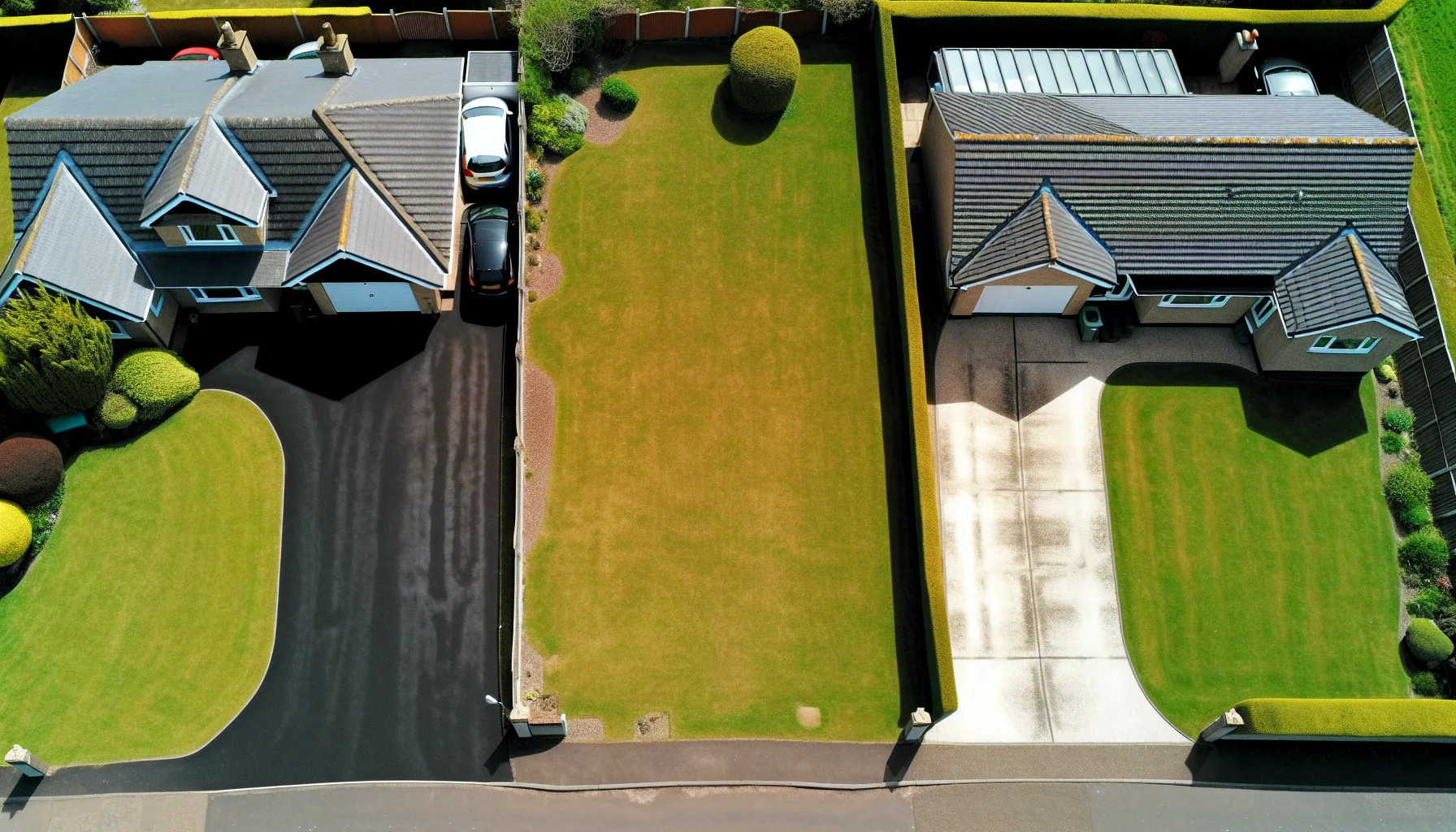Asphalt vs Concrete: Which is the Best Material for Your Driveway?
Are you weighing the benefits of asphalt vs concrete for your driveway? Cost, maintenance, and weather compatibility play pivotal roles in this decision. Asphalt is cost-effective and weather-resilient, making it a favorite in colder regions, while concrete boasts significant durability and a myriad of design options. This guide compares both materials, giving you the insights you need on functionality, upkeep, and aesthetics to pinpoint the ideal choice for your property’s needs and your personal style.
TLDR; Key Takeaways
- Concrete driveways offer greater durability and a longer lifespan of up to 50 years compared to asphalt’s 20 to 30 years, but they may require more costly and extensive repairs over time.
- Asphalt driveways are initially more cost-effective, with lower installation costs and simpler, less expensive repairs, though they necessitate more frequent maintenance such as sealcoating every three to five years.
- Environmental considerations, such as asphalt’s recyclability and lower energy production demands, contrast with concrete’s long lifespan and high recyclability, impacting the environmental footprint of each material.
Understanding Asphalt and Concrete Driveways

Selecting the appropriate material for driveways often boils down to two prevalent options: concrete and asphalt. Understanding their distinct differences is crucial, considering both consist fundamentally of an aggregate mix—sand and crushed stone. Asphalt employs a binder made from bitumen, derived from petroleum products, contrasting with concrete’s use of cement as its bonding agent.
The procedures involved in laying these materials vary significantly. For asphalt driveways, construction includes multiple layers capped off by asphalt concrete. In contrast, creating a durable surface for concrete driveways requires meticulous blending of aggregates alongside the correct proportions of cement and water.
Asphalt Driveways
Asphalt driveways, a type of hot asphalt pavement, are composed of high-quality aggregates and a petroleum-based binder. They are a common sight in many neighborhoods due to their smooth, black appearance, which is not only visually appealing but also offers a level of flexibility that is beneficial, especially in cold climates.
Installation involves removing the existing surface, grading the slope for efficient drainage, and compacting a base layer of crushed rock. These steps help ensure optimal binder viscosity, surface density, and stability, contributing to the driveway’s longevity.
Concrete Driveways
In contrast, concrete driveways are famous for their versatility and durability. With proper installation, a concrete driveway can serve you for decades, making it a viable option for long-term use. These driveways are composed of aggregates such as sand and crushed stone, combined with water and cement to create a robust material.
The lifespan and resistance of concrete driveways are increased by a well-graded mix of aggregates, the correct amount of cement and water, and proper concrete driveway installation. With a compressive strength able to withstand 6,000 PSI, concrete is double as strong compared to asphalt, making it a top choice for homeowners seeking a high-performance driveway.
Comparing Durability and Lifespan

Now that we’ve covered what each material is made of and how they are installed, let’s delve into one of the most important factors when choosing a driveway material: durability and lifespan. Generally, concrete driveways tend to outlast their asphalt counterparts, boasting an impressive lifespan of around 50 years or more, compared to asphalt’s 15-30 years with proper maintenance.
However, these figures are not set in stone. The longevity of a driveway is significantly influenced by factors like climate and traffic volume. For instance, asphalt driveways can be more resilient in colder climates, and able to withstand the harsh freeze-thaw cycles without cracking. On the other hand, concrete driveways, despite being able to carry heavier loads, may not perform as well with frequent traffic.
Asphalt Durability and Lifespan
Asphalt driveways can endure for 20 to 30 years if they receive appropriate upkeep, which helps extend their usefulness. While this is not as long-lasting as concrete driveways, asphalt still offers benefits through its simpler and more affordable repair process that may lead to reduced overall costs.
Asphalt driveways are especially well-suited for regions with cooler temperatures. Asphalt’s capacity to flexibly expand and contract in response to changes in temperature makes it less prone than concrete to severe harm caused by the cycles of freezing and thawing.
Concrete Durability and Lifespan
On the flip side, concrete driveways are known for their strength and durability. Able to last up to 50 years, they offer homeowners a reliable and long-lasting solution for their driveway needs, with a solid concrete surface.
The durability of concrete driveways is enhanced by the material’s resistance to a variety of environmental factors such as freeze-thaw cycles, de-icing chemicals, and UV exposure. Despite the potential for cracking in cold climates, the overall material strength of concrete helps resist environmental damage, ensuring a durable and long-lasting driveway.
Maintenance and Repair Considerations

In comparing asphalt and concrete driveways, factors beyond durability and lifespan should also be considered. Other aspects play a role in making an informed decision. Maintenance and repair requirements are equally important, as these can significantly impact the long-term costs associated with your driveway.
Typically, asphalt driveways require sealcoating within the first year, and every three to five years thereafter. In contrast, concrete driveways might need a sealant application every five to ten years. The frequency and cost of these maintenance tasks, along with potential repairs, can vary significantly between the two materials.
Asphalt Maintenance and Repair
Maintaining asphalt driveways properly is essential for extending their useful life. Routine upkeep should involve:
- Applying sealcoat within the first six months following installation
- Reapplying a coat of sealant every three to five years thereafter
- Fixing cracks and potholes as needed
- Use deicing chemicals judiciously because they have the potential to hasten the degradation and weaken the structural integrity of asphalt surfaces.
Thankfully, when it comes to repairs on asphalt driveways, expenses tend not to be prohibitive. Many homeowners find that they can personally handle DIY fixes in an economical manner. Such self-service methods typically encompass straightforward procedures for patching up cracks and fixing potholes.
Concrete Maintenance and Repair
Concrete driveways, on the other hand, require regular cleaning, including sweeping and pressure washing, in addition to sealant application every two to five years to prevent water penetration and damage. A stained concrete driveway, however, adds an aesthetic appeal to your home while still requiring the same maintenance as regular concrete driveways.
While concrete driveways require less maintenance initially, they may need extensive repairs over time. For minor and hairline crack repairs, homeowners can use products like concrete patch compounds or polyurethane sealants. However, more complex repairs, such as resurfacing, can be more costly and may require professional attention.
Cost Comparison: Asphalt vs Concrete Driveways

When examining the durability, longevity, and upkeep needs of both substances, price becomes an important factor to weigh. It’s essential to take into account not just the upfront installation costs, but also long-term financial commitments tied to maintenance and possible repairs.
Concrete driveways are concrete driveways. Have a higher installation cost – about double that of asphalt driveways. Their reduced maintenance demands and extended service life may offset the initial outlay as time goes on. On the flip side, although asphalt is initially easier on your wallet, it necessitates more regular attention compared to concrete in terms of maintenance.
Initial Installation Costs
Installing an asphalt driveway usually ranges from $5 to $15 for each square foot, while the installation of concrete driveways can run between $8 to $18 per square foot, positioning concrete as the pricier choice at first glance.
Nevertheless, initial costs are not the only financial consideration. Attempting a do-it-yourself approach with an asphalt driveway might appear economical initially, but may incur extra outlays related to renting equipment, obtaining permits, and rectifying mistakes. Homeowners should weigh all possible expenses when evaluating both materials for their driveway needs.
Long-Term Expenses
Considering not only the upfront costs but also the enduring financial implications is crucial when choosing between driveway materials. Driveways made of concrete boast an impressive longevity, with potential lifespans reaching 50 years, and are recognized for their cost-efficiency over time due to their robustness and low maintenance needs.
On the other hand, driveways surfaced with asphalt may be less costly at first glance, yet they require more regular upkeep. Despite this increased need for maintenance, like purchasing sealer material and purchasing equipment, tend to be simpler and more economical, which could lead to reduced long-term outlays.
Aesthetics and Customization Options
In addition to practical considerations like cost, durability, and maintenance, the aesthetics and customization options also influence the decision-making process. After all, your driveway is an extension of your home, and its appearance can significantly impact your property’s curb appeal.
When it comes to choosing between a concrete or asphalt driveway, it’s important to consider the differences in appearance and design flexibility. Asphalt driveways typically have a smooth, black appearance with limited customization options. On the other hand, concrete driveways offer more versatility in both appearance and design flexibility, allowing for a more personalized look.
Asphalt Aesthetics and Customization
Asphalt driveways offer a sleek, black appearance that can add a touch of elegance to any property, and a new asphalt driveway can enhance this effect even more. However, their color options are generally limited to varying shades of black and gray.
Despite this, there are ways to add charm and character to an asphalt driveway. Some options include:
- Curves: Adding curves to the driveway can provide a softer aesthetic and break up the monotony of a straight driveway.
- Cobblestone edges: Installing cobblestone edges can prevent damage to the asphalt and add a unique touch to the driveway.
- Colored sealants or asphalt: Using colored sealants or asphalt can complement the home’s exterior or create visual contrast.
These options can help enhance the appearance of an asphalt driveway and make it more visually appealing.
Concrete Aesthetics and Customization
On the contrary, concrete driveways present an extensive selection of design choices and personalization opportunities. Stamped concrete permits the replication of textures resembling brick or stone, while colored dyes and stains enrich the creative options for homeowners seeking distinctiveness in their driveway’s appearance.
Employing a mix of these methods can transform a simple functional driveway into a work of art. When installed by skilled professionals, such artistic craftsmanship on concrete driveways elevates the visual appeal of one’s property, greatly enhancing its curb appeal.
DIY vs Professional Installation: Which is Best?
Once the driveway material and design have been decided, the following step is installation. Here, homeowners face another choice: DIY or professional installation. While DIY projects can offer cost savings and a sense of satisfaction, they also come with the risk of mistakes due to potential inexperience and the need to comply with local building codes and permit requirements.
On the other hand, professional contractors bring experience and expertise to the table. They handle all aspects of the installation process, including securing permits and complying with codes. While their services come at a higher cost, the result is often a high-quality, long-lasting driveway.
Environmental Impact of Asphalt and Concrete Driveways
As environmental sustainability becomes increasingly critical, considering the environmental impact of your driveway material choice is of utmost importance. Both asphalt and concrete driveways have a footprint, involving a significant amount of energy consumption in their production processes. However, it’s worth noting that asphalt driveways are 100% recyclable and require 20% less energy for production compared to other materials.
Concrete driveways have several environmental benefits.
- They are highly recyclable
- They have a long lifespan, reducing resource consumption and waste
- For every concrete driveway installed, at least two asphalt driveways would need to be installed or redone, making concrete a more environmentally sound choice in the long run.
Choosing the Right Driveway Surface for Your Needs
The selection of the right driveway surface hinges on multiple factors, including:
- Budget
- Local climate
- Maintenance preferences<
- Design aesthetic
For instance, if you live in a colder climate, an asphalt driveway may be more suitable due to its ability to withstand freeze-thaw cycles better than concrete.
On the other hand, if you’re looking for a driveway that requires minimal maintenance and offers a wide range of design customization options, a concrete driveway may be the perfect fit. The key is to weigh all these factors against your personal preferences to make a decision that offers the best return on investment.
Summary
Installing a new driveway is a significant investment, and the choice between asphalt and concrete is one that requires careful consideration. Both materials have their advantages and disadvantages, with asphalt offering a more budget-friendly and flexible option, especially in colder climates, and concrete offering a durable and customizable solution with a longer lifespan. Your choice ultimately depends on your individual needs, preferences, and circumstances.
In the end, whether you choose asphalt or concrete, the key to a lasting and aesthetically pleasing driveway lies in the quality of the installation and regular maintenance. So take your time, weigh all the factors, and make a choice that you’ll be happy with for years to come.
To learn more about asphalt and its nuances, be sure to read this article about the differences between asphalt and blacktop.
Frequently Asked Questions
What is better asphalt or concrete?
Compared to asphalt, concrete is markedly superior in durability, displaying a greater resistance to the impacts of weather and continual use.
Consequently, for individuals owning numerous vehicles or experiencing considerable pedestrian activity at their homes, opting for concrete is the advisable selection.
Is it cheaper to pour concrete or asphalt?
In conclusion, it is generally cheaper to pour asphalt than concrete, with asphalt costing around $3 to $4 per square foot to install, while concrete typically costs at least $6 per square foot.
What are the cons of asphalt driveways?
Driveways made of asphalt might need more regular upkeep and tend to last for a shorter period when measured against other driveway materials, potentially leading to increased cumulative expenses for property owners. To find out the difference between gravel and asphalt millings check out this article.
What is the best surface for a driveway?
Opting for a concrete driveway offers an excellent surface choice due to its impressive durability, which ensures it can last between 25 and 50 years with the right installation and maintenance. It affords a stable and even base.
How long do asphalt and concrete driveways typically last?
Concrete driveways, when maintained correctly, can have a lifespan of up to 50 years, outlasting asphalt driveways which last between 20 to 30 years with proper upkeep.


